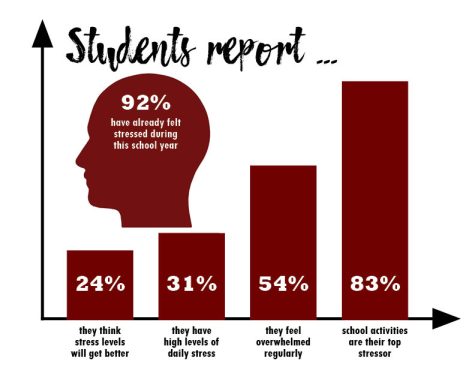Stressed out
Students are more overwhelmed than ever
September 18, 2022
American adolescence has undergone a drastic change. And things don’t seem to be getting better. Three decades ago, the most severe public health threats to teenagers in the United States came from binge drinking and drunken driving, teen pregnancy and smoking. While those rates have fallen sharply over the past decade or so, a new concern has taken their place: soaring rates of mental health disorders.
In 2019, 13 percent of adolescents said they had experienced at least one major depressive episode, a 60-percent increase from 2007. Incidents resulting in emergency room visits for anxiety, mood disorders and self-harm rose sharply during that same time period. Even worse, suicide rates leaped by nearly 60 percent for teens and young adults, according to the CDC.
For many teens, like adults, mental health issues intensified during the pandemic, but the upward spiral of issues started long before the first Covid-related shutdown happened. In fact, in late 2021, youth mental health was declared a national emergency by pediatric experts across the country.
Even before the arrival of COVID-19, in 2019, an average of nearly 36.7% of high school students reported persistent feelings of sadness or hopelessness, according to the CDC. For girls, the number was higher, coming in at 46.6%. New data released by the CDC at the end of March showed that the mental health of teens had declined further during the pandemic.
 And even with the worst of COVID apparently in the past, the stress remains. Everyday milestones are sometimes the worst, and freshman Yuliet Gonzalez said that moving to a new campus and starting high school volleyball has been tough on her.
And even with the worst of COVID apparently in the past, the stress remains. Everyday milestones are sometimes the worst, and freshman Yuliet Gonzalez said that moving to a new campus and starting high school volleyball has been tough on her.
“High school seems really different,” Gonzalez said. “There are more people and more expectations. I have social anxiety, so it’s a lot of pressure to be on the court and have so many eyes on you.”
And the stress doesn’t magically go away when high school is over or the 20th birthday rolls around. BHS graduate Taylor Lack said her new job as receptionist is something she loves because she has “lots of support” but that it is still tough.
“There is a lot of stress with this position,” Lack said. “You have to stay organized, you have to be on top of everything.”
What does excessive stress in teens and young adults look like? Pretty much the same as it looks in adults, but teens are less able to cope with the stress in their lives, which means that they are more likely to exhibit the symptoms of excessive stress:
- Irritability and anger: Teens don’t always have the words to describe how they are feeling and sometimes tension bubbles over into a bad mood. Stressed-out teens might be more short-tempered or argumentative than normal.
- Changes in behavior: A friend who used to be a great listener suddenly doesn’t want to talk. A socially-active teen doesn’t want to leave their house. These changes and other behavioral changes can be a sign that stress levels are high.
- Trouble sleeping: If a teen (or anyone) has trouble falling asleep at night, feels tired all the time, can’t stay asleep or has trouble getting up in the morning, stress might be the cause.
- Neglecting responsibilities: If a usually-responsible student suddenly drops the ball on homework, starts procrastinating more than usual, or is late all the time when they used to be on time, stress might be a factor.
- Eating changes: Eating too much or too little can both be reactions to stress. Weight gain or loss can show that eating changes have been taken to the extreme.
- Getting sick more often: Stress often shows up as physical symptoms. Teenagers who feel stress often report headaches or stomachaches.
That there is a problem is undeniable, but what can teens do to fix it? Some of the most obvious fixes, like getting enough sleep and having a good sleep routine, seem nearly impossible for students who play sports or have other extracurricular practices outside of school, who work at a part-time job, and who have hours of homework to complete at home.
“I did work at Dairy Queen, and I quit. I didn’t want to quit. I hate even saying the word quit. But it was all getting to be too much,” junior Kadance Britt said. “I had been working since June but it was getting really hard. The managers were relying on me a lot, and then volleyball started and then school started and it was getting really hard. And there was so much drama everywhere. It just made sense to quit until volleyball is over.”
Not enough sleep inevitably leads to caffeine consumption in an effort to try to stay awake. Ironically, then, a suggestion for managing stress is to avoid excess caffeine since it can increase feelings of anxiety and agitation. But for students who are running on too-little sleep and who need extra energy to get through the day, avoiding caffeine can be difficult. Add to that the ease at which energy drinks let consumers down lots of caffeine in just a few tasty sips, and caffeine abuse is almost inevitable.
“I’m pretty dependent on caffeine in all honesty,” junior Ryan Brown said. “Not coffee, because I hate coffee for whatever reason, but other types of caffeine. I used to drink a Monster Energy Drink every single day in the mornings. I’ve since switched to tea. I probably consume at least a soda per day.”
So, what can you do to cut stress and feel better? Start with that sleep idea. Get regular sleep, and get plenty of it. Sleep is essential for physical and emotional well-being. Experts recommend eight to 10 hours of sleep a night for teens. Sleep needs to be a priority to keep stress in check. To protect shut-eye, limit screen use at night. Put your cell phone across the room so you aren’t tempted to sneak in screen time if you wake up during the night. Taking care of getting enough sleep will also hopefully help you cut back on caffeine consumption.
Other things that might help:
- Talk it out. Talking about stressful situations with a trusted adult can help put things in perspective. If talking to a parent isn’t right, find another person to share with. Teachers, a counselor, pastors – all of these are options for someone to vent to. “Talking to somebody about your problems and stress helps your mental health,” counselor Debbie Read said. “When you talk to somebody about your problems, it helps to get it off of your chest.”
- Get outside. Spending time in nature is an effective way to relieve stress and improve overall well-being. Researchers have found that people who live in areas with more green space have less depression, anxiety and stress.
- Write about it. Research shows that writing in a journal can help reduce mental distress and improve well-being. Some research has found that writing about positive feelings, such as the things you’re grateful for or proud of accomplishing, can help to alleviate symptoms of anxiety and depression.







